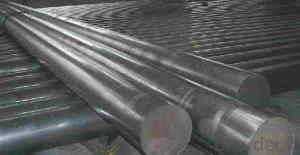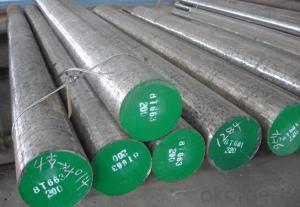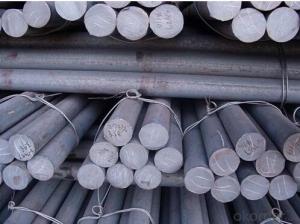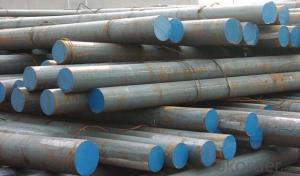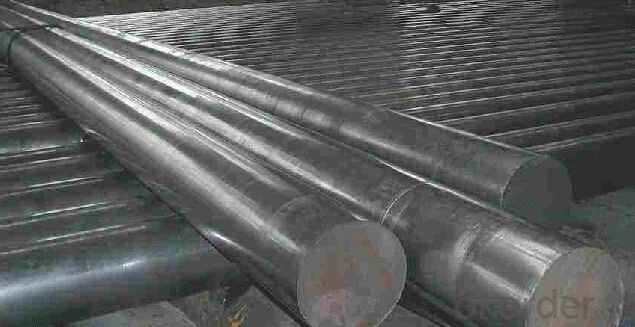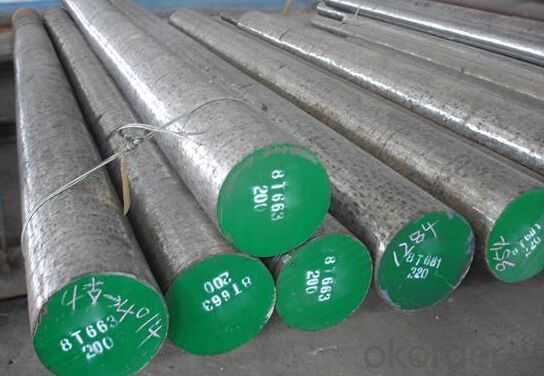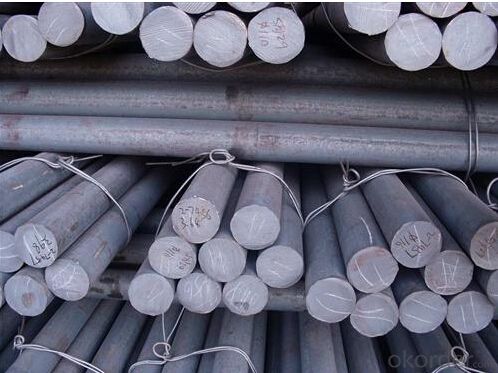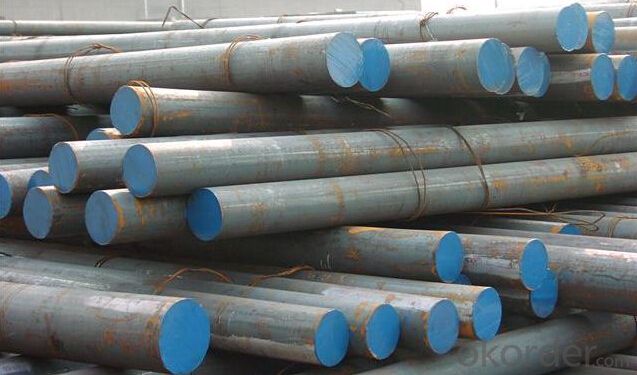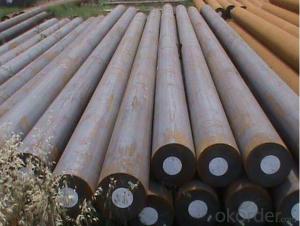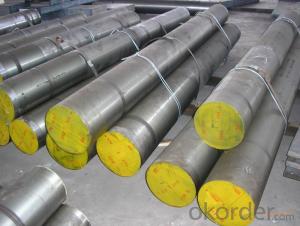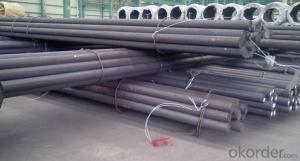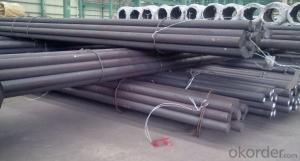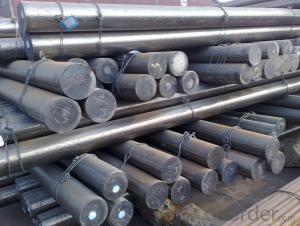Grade SAE52100 CNBM Bearing Steel Round Bar
- Loading Port:
- Shanghai
- Payment Terms:
- TT OR LC
- Min Order Qty:
- 25 m.t
- Supply Capability:
- 10000 m.t/month
OKorder Service Pledge
OKorder Financial Service
You Might Also Like
Specification
Specification of Round Bar
1, Dimention of 52100 Alloy Steel | ||||||||
| Round bar | Diameter(mm) | Length (mm) | ||||||
| 20~800 | 3000~9000 | |||||||
| Plate | Thickness(mm) | Width (mm) | Length (mm) | |||||
| Max:800 | Max:2200 | Max:9000 | ||||||
| The specification can be customized. | ||||||||
| 2, Chemical Compositions (%) | ||||||||
| Grade | C | Si | Mn | P | S | Cr | Mo | Ni |
| GCr15 | 0.95-1.05 | 0.15-0.35 | 0.25-0.45 | ≤0.025 | ≤0.025 | 1.40-1.65 | ≤0.10 | ≤0.30 |
| E52100 | 0.93-1.05 | 0.15-0.35 | 0.25-0.45 | ≤0.025 | ≤0.015 | 1.35-1.60 | ≤0.10 | ≤0.25 |
| SUJ2 | 0.95-1.10 | 0.15-0.35 | ≤0.50 | ≤0.025 | ≤0.025 | 1.30-1.60 | ≤0.08 | ≤0.25 |
| 100Cr6 | 0.93-1.05 | 0.15-0.35 | 0.25-0.45 | ≤0.025 | ≤0.015 | 1.35-1.60 | 0.1 | |
| 3, Features of 52100 alloy steel | ||||||||
| 1, High carbon alloy steel | ||||||||
| 2, High degree of hardness | ||||||||
| 3, Good compressive strength and abrasion resistance | ||||||||
| 4, Typical Applications | ||||||||
| 1, Taps, gauges, swaging dies, ejector pins | ||||||||
| 2, Ball and roller bearings | ||||||||
| 3, Machine parts and for press tools | ||||||||
Our Featured Products
Alloy steel: Combination of steel / Bearing steel// Spring steel/ Cr- mo steel
GB 20Cr/ 40Cr / 42CrMo / 35CrMo/ 20CrMn/GCr15/30CrMnTi…
ASTM 5120 /5140 / 4140/ 4135/ 5152/52100…
JIS SCr420H/ SCr440/ SCM3/ SUP9/SUJ2…
Carbon steel: Carbon tool steel /Carbon Structural Steel
GB 20/ 35 /45/…
ASTM 1020/ 1030/1045…
JIS S20C/ S30C / S45C…
Usage and Applications of Round Bar
1. Chinese standard steel bar is often used where large amounts of steel need to be formed, for example as structural steel.
2. And we can use this kind of product on the performance of the mechanical parts if the demand is not very high.
3. Steel round bar is used in construction and a large number of architectural and engineering structures.
Packaging & Delivery of Round Bar
Packaging Detail: All goods are packed in bundle with steel strips and shipped by break bulk vessel or container (depend on target market and different ports)
Delivery Detail: 15~45 days
Trade terms: FOB, CFR, CIF
MOQ: 25 metric tons per specification; we can negotiate the quantity if the specification is normal or we have stock of one specification.
Weight: Theprice invoicing on theoretical weight basis or actual weight basis depends on customer’s request.
Shipment: The shipment of bulk break or container is depends on customer’s request and the situation of the port of destination.
Documents given: Full set of original clean on board bill of lading; Original signed commercial invoice; Original packing list; Policy of insurance; Certificate of origin and what the target market needs.
Production Flow of Round Bar
1. The common processes are preheated forging quenching, dual refinement solution process, cooling quenching and isothermal quenching. We use heat treatment for dual refinement solution process.
2. Material prepare (billet) — heat up — rough rolling — precision rolling — cooling — packing — storage and transportation
FAQ:
Q1: Why buy Materials & Equipment from OKorder.com?
A1: All products offered byOKorder.com are carefully selected from China's most reliable manufacturing enterprises. Through its ISO certifications, OKorder.com adheres to the highest standards and a commitment to supply chain safety and customer satisfaction.
Q2: How do we guarantee the quality of our products?
A2: We have established an advanced quality management system which conducts strict quality tests at every step, from raw materials to the final product. At the same time, we provide extensive follow-up service assurances as required.
Q3: How soon can we receive the product after purchase?
A3: Within three days of placing an order, we will begin production. The specific shipping date is dependent upon international and government factors, but is typically 7 to 10 workdays.
Q4: What makes stainless steel stainless?
A4: Stainless steel must contain at least 10.5 % chromium. It is this element that reacts with the oxygen in the air to form a complex chrome-oxide surface layer that is invisible but strong enough to prevent further oxygen from "staining" (rusting) the surface. Higher levels of chromium and the addition of other alloying elements such as nickel and molybdenum enhance this surface layer and improve the corrosion resistance of the stainless material.
Q5: Can stainless steel rust?
A5: Stainless does not "rust" as you think of regular steel rusting with a red oxide on the surface that flakes off. If you see red rust it is probably due to some iron particles that have contaminated the surface of the stainless steel and it is these iron particles that are rusting. Look at the source of the rusting and see if you can remove it from the surface.
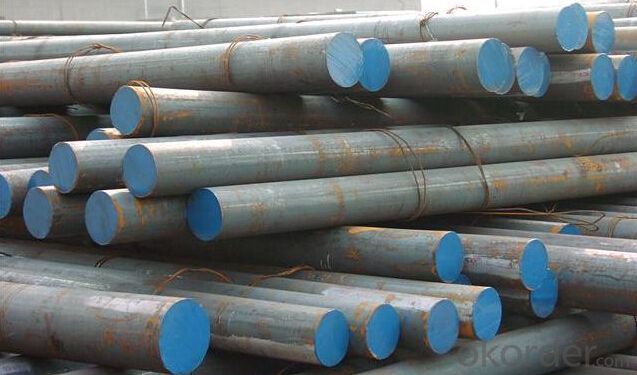
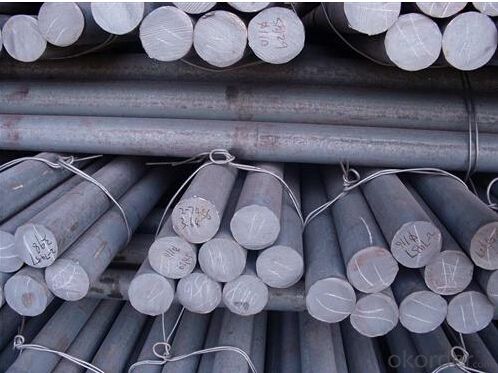
- Q: How is shock-resistant steel used in the production of impact tools?
- Shock-resistant steel is used in the production of impact tools because it has enhanced toughness and can withstand the high impact forces generated during use. This steel is specifically engineered to absorb and distribute the shock and vibrations produced when the tool strikes an object, reducing the risk of breakage and increasing the tool's overall lifespan.
- Q: What are the common quality control measures for special steel?
- Common quality control measures for special steel include: 1. Chemical Composition Analysis: Special steel often requires specific chemical compositions to meet the desired properties. Quality control measures involve analyzing the chemical composition through techniques like spectrometry to ensure it meets the required specifications. 2. Mechanical Testing: Special steel needs to possess specific mechanical properties such as strength, hardness, toughness, and ductility. Quality control measures involve conducting mechanical tests like tensile testing, hardness testing, impact testing, and fatigue testing to ensure the steel meets the required standards. 3. Non-Destructive Testing: Non-destructive testing methods like ultrasonic testing, magnetic particle testing, and dye penetrant testing are employed to detect any internal or surface defects in the steel. These tests help ensure the integrity and reliability of the special steel. 4. Dimensional Inspection: Special steel often requires precise dimensions for its intended application. Dimensional inspection involves measuring the length, width, thickness, diameter, and other critical dimensions to ensure they meet the required tolerances specified by the customer or industry standards. 5. Surface Quality Inspection: Special steel may require specific surface finishes or coatings to enhance its performance or resistance to corrosion. Quality control measures involve inspecting the steel surface for defects such as cracks, pits, scratches, or unevenness to ensure it meets the required surface quality standards. 6. Heat Treatment Verification: Special steel often undergoes heat treatment processes like annealing, quenching, or tempering to achieve the desired mechanical properties. Quality control measures involve verifying the effectiveness of the heat treatment process through hardness testing or microstructure analysis. 7. Documentation and Traceability: Quality control measures also involve maintaining comprehensive documentation and traceability records of the special steel, including details of its production process, chemical composition, mechanical properties, and any inspections or tests performed. This helps ensure quality consistency and provides a reference for future use or troubleshooting. By implementing these quality control measures, manufacturers can ensure that special steel meets the required specifications, providing customers with high-quality and reliable products for their specific applications.
- Q: How does special steel contribute to the energy industry?
- Special steel plays a crucial role in the energy industry by providing high-strength, corrosion-resistant materials that are essential for various applications. It is used in the construction of power plants, oil and gas pipelines, and offshore drilling platforms, ensuring the structural integrity and reliability of these critical infrastructure. Special steel also enables the production of more efficient wind turbines and solar panels, enhancing their performance and durability. Additionally, it is utilized in the manufacturing of equipment used in nuclear power plants, where its unique properties ensure safety and long-term operation. Overall, special steel is a vital component in the energy industry, supporting its growth, sustainability, and technological advancements.
- Q: Can special steel be used for making aerospace engine components?
- Yes, special steel can be used for making aerospace engine components. Special steel alloys, such as nickel-based superalloys and stainless steels, are commonly used in the aerospace industry due to their excellent mechanical properties, high temperature resistance, and superior corrosion resistance. These alloys are specifically designed to withstand the extreme conditions and demands of aerospace engines, including high temperatures, pressures, and stress levels. Additionally, special steel alloys offer high strength-to-weight ratios, which is crucial for reducing the weight of aerospace components while maintaining structural integrity. Therefore, the use of special steel in aerospace engine components ensures the reliability, performance, and safety of the engines in aeronautical applications.
- Q: What are the properties of case-hardening steel?
- Case-hardening steel typically has a low carbon content, making it relatively soft and ductile. However, when subjected to a specialized heat treatment process, such as carburizing or nitriding, the surface of the steel becomes hardened while the core remains relatively tough. This allows case-hardening steel to possess excellent wear resistance and high surface hardness, making it ideal for applications that require both strength and durability, such as gears, shafts, and other mechanical components.
- Q: What are the different corrosion protection techniques used for special steel?
- There are several corrosion protection techniques used for special steel, including: 1. Coatings: Applying protective coatings like paints, epoxy, or polyurethane can create a barrier between the steel surface and corrosive elements, preventing direct contact and oxidation. 2. Galvanization: Special steel can be hot-dip galvanized, where a layer of zinc is applied to the surface. This zinc layer acts as a sacrificial anode, corroding in place of the steel and providing protection against corrosion. 3. Cathodic protection: This technique involves connecting the special steel to a sacrificial anode, such as zinc or magnesium, through an electrical circuit. The anode corrodes instead of the steel, extending its lifespan. 4. Passivation: Passivation is a chemical process that removes free iron and other contaminants from the surface of the steel, creating a passive oxide layer that enhances corrosion resistance. 5. Alloying: By adding specific alloying elements like chromium, nickel, or molybdenum to the special steel, its corrosion resistance can be significantly improved. 6. VCI (Volatile Corrosion Inhibitors): VCI techniques involve using chemicals that emit volatile corrosion inhibitors, which form a protective layer on the steel surface, inhibiting corrosion. It is important to assess the specific requirements, environment, and intended application of the special steel in order to select the most suitable corrosion protection technique.
- Q: Can special steel be used in railway applications?
- Railway applications often utilize special steel, which is also referred to as alloy steel or high-strength steel. This type of steel possesses distinct characteristics that make it suitable for a wide range of demanding applications, including railways. Its exceptional strength, durability, and resistance to wear make it an ideal choice for railway components that endure high loads, vibrations, and extreme conditions. In the realm of railway applications, special steel is commonly employed in the manufacturing of rails, wheels, axles, and other crucial components. Rails crafted from special steel have the ability to handle heavy train traffic while providing a smooth and stable ride, all the while resisting wear and deformation. Special steel wheels and axles offer remarkable strength and toughness, ensuring safe and dependable operation even under heavy loads and high-speed conditions. Furthermore, special steel is frequently utilized in the construction of railway bridges, tunnels, and other infrastructure projects. Its exceptional strength and resistance to corrosion and fatigue make it suitable for supporting heavy trains and withstanding the environmental challenges associated with railway construction. Moreover, the utilization of special steel in railway applications can result in cost savings and efficiency improvements. Its high durability and wear resistance minimize the need for frequent maintenance and replacement, leading to reduced maintenance costs and an extended service life for railway components. In conclusion, special steel possesses the necessary strength, durability, and performance required for railway applications. Its unique properties make it an ideal choice for ensuring the safety, reliability, and efficiency of rail transportation systems.
- Q: What are the environmental benefits of using special steel?
- Special steel, also known as stainless steel, offers numerous environmental benefits. Firstly, it is highly durable and long-lasting, resulting in reduced waste and resource consumption over time. Additionally, stainless steel is 100% recyclable, allowing it to be repurposed indefinitely without any loss in quality. This recycling process requires significantly less energy compared to the production of new steel, leading to a considerable reduction in carbon emissions and environmental impact. Moreover, special steel is corrosion-resistant, eliminating the need for frequent replacements and reducing the use of resources and energy associated with maintenance. Overall, the environmental benefits of using special steel include decreased waste generation, lower energy consumption, reduced carbon emissions, and increased resource efficiency.
- Q: How is high-speed tool steel used in the production of machining tools?
- High-speed tool steel is used in the production of machining tools due to its exceptional heat resistance, hardness, and wear resistance. It allows for the efficient machining of materials at high speeds, reducing production time and enhancing productivity. This steel is commonly utilized in the manufacturing of cutting tools, such as drills, milling cutters, and taps, to ensure precision and durability in machining operations.
- Q: How does nitriding steel improve hardness and wear resistance?
- Nitriding steel improves hardness and wear resistance by introducing nitrogen into the steel's surface through a heat treatment process. This forms nitrides, which are hard compounds that increase the material's surface hardness. Additionally, the nitrogen atoms create compressive stresses within the structure, enhancing the material's resistance to wear and fatigue.
Send your message to us
Grade SAE52100 CNBM Bearing Steel Round Bar
- Loading Port:
- Shanghai
- Payment Terms:
- TT OR LC
- Min Order Qty:
- 25 m.t
- Supply Capability:
- 10000 m.t/month
OKorder Service Pledge
OKorder Financial Service
Similar products
Hot products
Hot Searches
Related keywords
